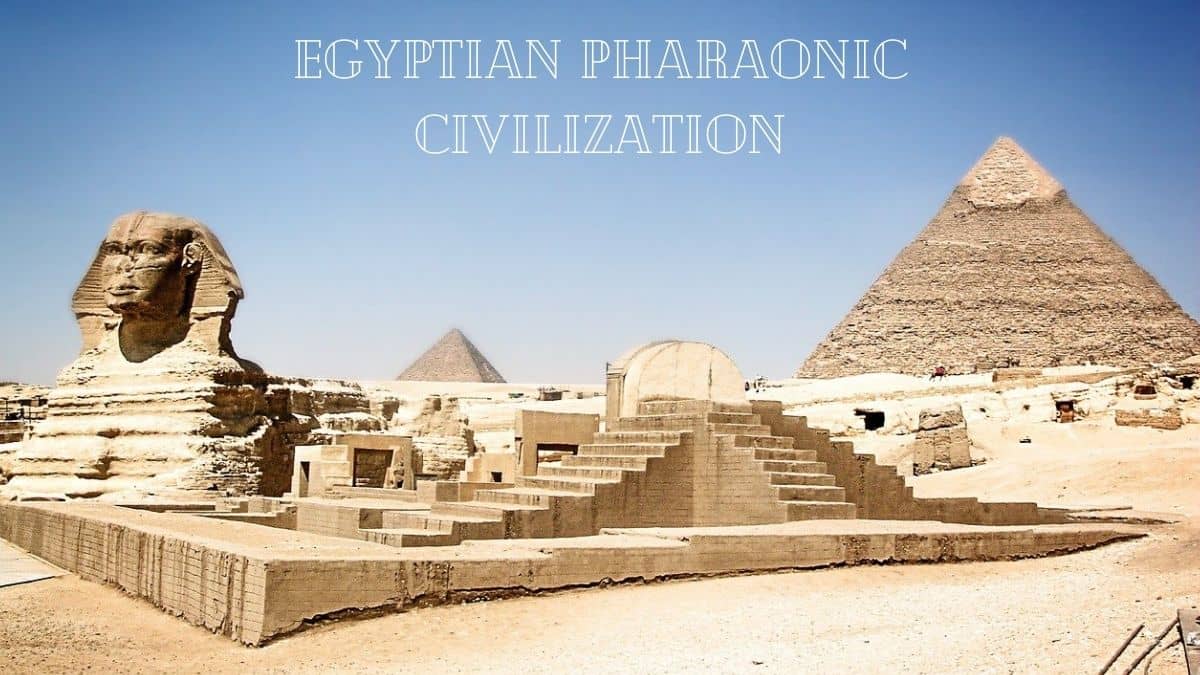
Egyptian pharaonic civilization
The Egyptian pharaonic civilization has many secrets, that have still not been revealed yet. The Arab Republic of Egypt is one of the countries that have succeeded in many civilizations, leaving different effects that appeared in the treasures found by researchers.
- The periods that passed through Egypt were into two eras, so the first era was the history of ancient Egypt and the second is the history of modern Egypt.
- The ancient Egyptians founded the concept of writing, due to their need for writing. Therefore they invented letters and signs.
- This language is called hieroglyphic language so we know a lot of details about them and their huge achievements in all fields of life.
- The Egyptians were distinguished by their recording of all the events and innovations of their life and history, thus Egypt became the first country with a recorded written history.
When did the Ancient Pharaonic civilization begin?
- Egyptian civilization began around the year 3150 BC when King Mina united Upper and Lower Egypt. But these stable periods are interspersed with periods of weakness.
Pharaonic era:
It is divided into periods, each one has its characteristics, such as:
- Predynastic period
- Early Dynastic Period (3150–2686 BC)
- Old Kingdom (2686–2181 BC)
- First Intermediate Period (2181–2055 BC)
- Middle Kingdom (2134–1690 BC)
- Second Intermediate Period (1674–1549 BC)
- New Kingdom (1549–1069 BC)
- Third Intermediate Period (1069–653 BC)
- Late Period (653–332 BC)
Who are the greatest pharaohs in ancient Egypt?
All the Ancient pharaohs are great, but the greatest pharaohs who made great and valuable achievements, such as:
- Ramses II (reign 1279–1213 BC)
- Tutankhamun (reign 1332–1323 BC)
- Thutmose III (reign 1458–1425 BC)
- Hatshepsut (reign 1478–1458 BC)
- Khufu (reign 2589 ‒ 2566 BC)
- Akhenaten (reign 1351–1334 BC)
- Djoser (reign 2686 – 2649 BC)
- Khufu (reign 2589 ‒ 2566 BC)
- Amenhotep III (reign 1388 –1351 BC)
Where did the Ancient Egyptians settle?
- They settled along the Nile River on both banks east and west.
How did the Egyptian pharaonic civilization flourish?

Ancient Egyptians were able to develop and flourish, due to their adaptation to the surrounding conditions, such as:
1) The great Nile:
They determined the periods of the Nile flood so that they exploited it to produce many agricultural crops.
2) The climate:
Agriculture flourished, due to the availability of water, fertile soil, and the appropriate climate. This contributed to the social and cultural development of the population.
3) The valley and desert:
Ancient Egyptians make use of the minerals in the valley and the desert around them.
4) Availability of many quarries:
Egypt was able to exploit quarries and adopt advanced construction techniques in that period. So that helped them build huge pyramids and temples.
Achievements of the Egyptian pharaonic civilization
There are many achievements of the Egyptian pharaonic civilization, as it influenced all surrounded countries, we will mention the most important achievements such as:
1. Writing:
Hieroglyphic language:
- Ancient Egypt is the first country that recorded its history by writing.
- They invented signs and engrave them on their monuments, known as the hieroglyphic language.
Papyrus:
- First, they carved this language in stone or other hard materials.
- Second, they learned how to make papyrus, which is long-lasting.
2. Medicine:
Prescriptions:
- The Pharaohs came up with many prescriptions, so they helped in curing many diseases.
- These medicines are shown in international museums all over the world, for instance, Paris, Leiden, London, Berlin, and Turin.
- Their medicine books are shown in the Museum of the Historical Society in New York. These books discuss surgeries and injuries to different parts of the body.
Mummification:
- In addition to their special burial customs, they adopted the mummification process.
- No one knows what is the materials they used which is still a secret till now.
3. Mathematics:
They developed a full numeral system, as mathematical calculations were used in ancient Egypt.
4. Economy and commerce:
The pharaohs relied on the barter system and then used the currency, and sent trade missions all over the world.
5. Agriculture:
The ancient Egyptians are the first to use the irrigation system.
6. Military forces:
- The ancient Egyptian state was able to strengthen military forces.
- Developed military tools included bows, arrows, and shields made animal skins.
- They resisted external enemies so that the Pharaonic domination increased over the country.
- Due to the pharaoh’s view of the necessity of national unity among the population.
7. Religion:
- They believed that there is a God for this universe, so they built temples to worship.
- They also adopted the idea of the afterlife, which led them to build their huge tombs as pyramids.
8. Art:

- Pharaos’ statues in museums all over the world prove the creativity of Pharaohs with art.
- They left behind coffins, statues, furniture, and marble tools.
- In addition to inscriptions on the walls of the monuments that show the amount of artistic progress in their age.
9. Architecture:
You can enjoy this pharaonic architecture everywhere in Egypt, because it is everywhere in Egypt, such as:
- Giza pyramids, Sphinx, in Giza city.
- Egyptian Museum and Grand Egyptian Museums in Cairo city
- Luxor temple, Karnak temple, Vally of the kings and queens, Deir el-Bahari, Deir el-Madina, and Ramessuim in Luxor city.

- Edfu temple, Philae temple, Abu simple temple, Kom Ombo temple, and Esna temple.
In addition to many other great treasures that prove the creativity of the ancient Egyptian Pharoah.
In conclusion, Egypt’s history is full of many civilizations that passed through it and left many treasures and valuable heritage. So No one can deny that pharaonic history is full of many secrets and achievements. Which built great culture and civilization; as a result, it affected modern Egypt.
